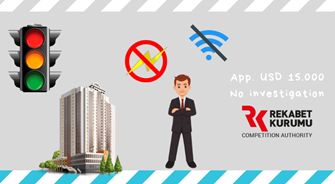The Turkish Competition Authority (the "TCA") is authorized to conduct on-the-spot inspections at company premises. It is important to note that interested parties are obliged to, within the scope of the Competition Act, provide copies of information, documents and books requested by TCA case-handlers conducting the inspection. In the event that the on-the-spot inspection is prevented, the TCA is authorized to return to the relevant undertaking to conduct such an inspection after obtaining a court decision. Non-compliance with these obligations is punishable by administrative fines. Undertakings preventing the inspection are expected to notify the TCA and inform it when the reasons for preventing the on-the-spot inspection are eliminated so that case-handlers can proceed with their inspection. An additional administrative fine is imposed on the undertaking for each day the TCA is not notified, since the obstruction continues until the receipt of such notification/invitation.
The latest TCA decisions show that high administrative fines may be imposed on undertakings against which a preliminary investigation has been initiated, even if the investigation is later discontinued.

For example, in 2018, the TCA initiated a preliminary investigation to determine whether eight undertakings operating in the traffic signaling sector engaged in bid rigging. The TCA conducted on-the-spot inspections at premises within the scope of the preliminary investigation. Case-handlers conducting an on-the-spot inspection at one of the undertakings investigated got suspicious when they noticed that certain e-mail correspondence disappeared following an electricity and internet outage. Case-handlers later discovered online communication between employees of the investigated party suggesting that they should shut down the internet and delete e-mail correspondence. Ultimately, case-handlers were not able to conduct or finalize their inspection. The TCA imposed an administrative fine totaling approximately US$ 15,000 on the undertaking, which only invited TCA case-handlers back to proceed with the inspection after sixteen days[1]. It is important to note that the TCA ultimately decided not to initiate an investigation against interested parties since it did not find sufficient evidence that undertakings violated the Competition Act.

In 2019, the TCA decided to initiate a preliminary investigation of six undertakings operating in the fertilizer sector in order to examine recent price increases. The TCA discovered an e-mail correspondence indicating anti-competitive information exchange between competitors during the on-the-spot inspection conducted at the premises of one of the undertakings concerned. Case-handlers were denied access to said correspondence on the account that it was forwarded to the business e-mail address of the employee from the employee's personal e-mail account. Accordingly, employees argued that personal e-mail correspondences are outside the scope of the on-the-spot inspection and examination of said correspondence is a clear violation of the constitutional right to privacy and freedom of communication. Next day, case-handlers returned to the premise of the undertaking with a court decision and obtained a copy of the document to which they were denied access. The TCA decided to impose an administrative fine on the undertaking, the amount of which is not published on the TCA's website, although it ultimately decided not to initiate an investigation[2].

Finally, the TCA decided to impose an administrative fine on an undertaking which prevented the on-the-spot inspection conducted by TCA case-handlers within the scope of a preliminary investigation initiated against six travel agencies[3]. According to the decision of the TCA, employees of the undertaking refused to provide organizational charts and denied case-handlers access to certain physical files. It is important to note that the undertaking also failed to duly provide information and documents requested by the TCA following the on-the-spot inspection. Accordingly, the TCA imposed an administrative fine in the total amount of approximately US$ 244,000, although it ultimately decided not to launch an investigation.
Its latest decisions clearly indicate that the TCA strictly monitors whether undertakings concerned fulfill their obligation to facilitate the investigation of the TCA. In the event that an undertaking prevents the on-the-spot inspection or fails to provide information/documentation requested by the TCA, large administrative fines might be imposed even though the TCA later decides that the undertakings did not violate the Competition Act. What is your view about the imposition of high administrative fines for denial of access to evidence, which does not indicate any anti-competitive behavior and which may be considered materially insignificant in proving that concerned parties violated the Competition Act?
[1] The decision of the TCA dated 21.06.2018 and numbered 18-20/356-176 and the decision dated 05.07.2018 and numbered 18-22/378-185.
[2] The decision of the TCA dated 07.02.2019 and numbered 19-06/51-18.
[3] The decision of the TCA dated 13.02.2019 and numbered 19-07/86-36.
The content of this article is intended to provide a general guide to the subject matter. Specialist advice should be sought about your specific circumstances.


